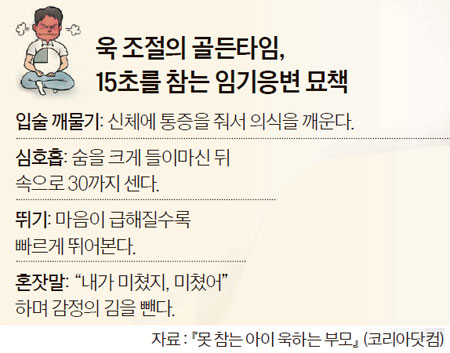https://www.psychologytoday.com/blog/animals-and-us/201610/narcissism-and-exotic-pets-is-there-connection
나르시시즘의 6가지 감지하기 어려운 신호들
감정 표현도 대물림..버럭 부모가 욱하는 아이 만든다
"감정 표현도 대물림..버럭 부모가 욱하는 아이 만든다"
오은영 소아정신과 전문의 인터뷰감정 발달은 부모와 관계서 형성부부싸움 잦거나 엄한 부모 최악화 치밀 땐 입술 깨물기, 혼잣말..'욱 조절 골든타임 15초'기억을중앙일보 이지영.권혁재 입력2016.05.12. 02:05 수정2016.05.12. 14:10기사 내용
지난 1일 대전의 한 아파트 엘리베이터에서 열여섯 살 A군이 함께 타고 있던 20대 여성을 갑자기 돌로 때려 크게 다치게 한 사건이 발생했다. A군은 경찰 조사에서 후배들이 말을 안 들어 화가 나서 생면부지의 여성을 때렸다고 진술했다.
10일 울산에 사는 40대 B씨는 보복운전을 한 혐의로 실형을 선고받았다. 뒤차가 경적을 울리는 것에 화가 나 다섯 차례 급제동하며 위험한 상황을 만들어서다. 또 지난해 충북 청주에선 부부싸움을 한 뒤 홧김에 여섯 살배기 아들을 살해한 주부 C씨가 붙잡혔다.
![정신과 전문의 오은영 박사는 “아이 앞에서 ‘욱’이 허용되는 상황은 없다”고 말했다. [사진 권혁재 사진전문기자]](http://t1.daumcdn.net/news/201605/12/joongang/20160512023705215iapd.jpg)
![[일러스트=심수휘 기자]](http://t1.daumcdn.net/news/201605/12/joongang/20160512023943121biyn.jpg)


분노조절 장애로 빚어진 사건·사고가 끊이지 않고 있다. 소아청소년정신과 전문의 오은영(51·오은영아카데미 원장) 박사는 “감정 조절을 못하고 욱하는 것에는 중독성이 있다”며 “욱한 뒤 느끼는 미묘한 쾌감에 중독돼 강도가 점점 세진다. 고치지 않으면 누구나 범죄자가 될 위험이 있다”고 말했다.
최근 육아서 『못 참는 아이 욱하는 부모』를 펴낸 그는 “감정 표현 방식은 대물림된다. ‘욱’의 파급력이 가장 강력한 곳이 바로 육아 현장”이라며 부모들의 각성을 촉구했다. “부모는 어떤 상황에서도 욱해선 안 된다”는 그를 만나 감정 조절 육아법을 들었다.
Q : 욱하는 성격이 만들어지는 데는 부모의 책임이 가장 큰가.
A : “그렇다. 감정 발달은 후천적이다. 부모와 자녀 관계에서 학습된다. 공격적인 감정은 강력하게 느껴지기 때문에 다른 감정보다 금방 배운다. 욱하는 부모 밑에서 자란 아이는 감정 발달과 감정 조절이 미숙해진다. 당황·민망·슬픔 등 다양한 감정이 ‘욱’으로만 표현된다. 또 자기의 감정을 지키기 위해 부모와 대립하게 되면서 점점 사나워진다. ‘욱’을 권하는 사회에도 문제가 있다. TV드라마나 예능프로그램에서 욱하는 성격을 정의로운 캐릭터로 미화하거나 유머 코드로 활용하는 경우가 너무 많다.”
Q : 어떤 부모가 아이를 분노조절 장애로 키울 위험이 가장 큰가.
A : “서로 싸우는 부모다. 특히 차 안에서 싸우면 아이는 생명의 위협까지 느낀다. 그 다음 위험한 부모는 영화 ‘사도’의 영조(송강호 분) 같은 유형이다. 지나치게 무섭거나 강압적이면서 융통성 없이 엄격하고 지시적인 부모는 아이 마음속에 분노가 쌓이게 한다.”
오 박사는 “25년 넘게 정신과 의사로 환자를 만나면서 ‘감정 조절을 못하고 욱하는 것’에 대한 고민이 점점 깊어졌다”고 말했다. “찾아온 환자의 80%가량이 욱하는 문제로 힘들어했고, 11년 남짓 출연한 TV프로그램 ‘우리 아이가 달라졌어요’에서도 문제의 핵심은 대부분 못 참고 욱하는 것이었다”는 이유에서다.
Q : 육아가 너무 힘들어 감정 조절이 안 된다는 부모가 많다.
A : “아이를 완벽하게 키우려고 과도하게 노력하는 과정에서 버럭 화내는 부모가 있다. 백번 잘해도 한 번 욱하면 아무 의미가 없다. 차라리 애쓰지 않는 편이 낫다. 또 유독 아이한테만 욱하는 사람 내면에는 아이를 ‘나 없이 못 사는 약자’로 보고 만만하게 대하는 심리도 있다. 불안이 ‘욱’의 주요 원인이 되기도 한다. ‘불안→불쾌→분노’로 번지기 쉽다.”
Q : 부모가 욱하지 않으려면 어떻게 해야 하나.
A : “감정 조절의 열쇠는 자존감과 자아 성찰이다. 자아 성찰 과정을 통해 자기 부모로부터 받은 상처나 채워지지 않은 의존욕구가 있는지 돌아봐야 한다. 또 화가 나는 상황에서 ‘욱’ 조절의 골든타임 ‘15초’를 기억하라. 분노 관련 호르몬이 최고조에 이르는 15초까지 시간을 벌 수 있도록 입술 깨물기나 심호흡·혼잣말 하기 등을 권한다.
Q : 의사의 전문적인 치료가 필요한 ‘욱’이 있다면.
A : “화가 날 때 물건을 집어 던지거나 부수는 경우, 배우자·자녀에게 폭력을 쓰는 경우, 술 마실 때 욱하는 정도가 더 심해지는 경우 등이다. 또 만 2세 이전 아이에게 욱하는 사람도 정신과 치료를 받아야 한다.”
글=이지영 기자 jylee@joongang.co.kr
사진=권혁재 사진전문기자
Plenty of people high in narcissism can be spotted right away. These grandiose narcissists constantly try to draw attention to themselves, even—or especially—at the expense of others. They feel entitled to special treatment and become enraged when they don’t get it. Another type, the vulnerable narcissist, also needs reassurance, but their insecurities are not expressed as overtly. Still, they can be entitled and exploitative.
How can you spot people whose narcissism is expressed more subtly? New research on the well-being of people high in narcissism provides ideas on how to pick them out of a crowd.
Psychologists typically conceptualize narcissism as a trait that you’re born, live, and die with: You spend the majority of your life seeking constant attention. Researchers Miranda Giacomin and Christian Jordan of Wilfrid Laurier University in Ontario decided to examine “state” narcissism—one's narcissism on a given day. After observing considerable variation in narcissism scores within the same people, tested over a 10-day period, they proposed that situations can amplify or reduce someone’s narcissistic tendencies. If you’re exposed to another person’s suffering, even if you’re relatively high in narcissism, you may, on that day or in that moment, become more empathic.
Giacomin and Jordan believe that one of the factors affecting, or perhaps reflecting, these day-to-day variations in narcissism might be a person’s feelings of subjective well-being. This can work both ways, of course: On a day when you’re feeling good, your self-esteemis higher, and you’ll be more likely to endorse statements in which you express greater grandiosity. Conversely, you tap into your inner narcissist to boost your self-esteem if you’re feeling down.
The research team approached the daily vacillations in narcissism and well-being by having a group of undergraduates complete a narcissism scale during a 14-day period in which the reference point was “right now” instead of more generally. The researchers also gauged students' overall narcissism and self-esteem through their self-ratings, as well as their daily self-esteem, life satisfaction, and affect. As the researchers found in a prior study, there was about a 25 percent daily variation in narcissism. Consistent with predictions, the participants who scored high in daily narcissism also felt more satisfied with life in general.
Contrary to prediction, though, on days that people scored high in narcissism, they also scored higher on negative affect—in particular, the emotion of anger. As the authors conclude, “Narcissists are known to react aggressively and become more hostile when their positive self views are threatened." In other words, if people feel narcissistic on any given day, instead of feeling good, they become offended more readily and are more likely to snap.
The other key finding of the study is that on days when people were high in narcissism, they weren’t likely to have higher self-esteem. People high in the trait quality of narcissism, though, do feel better about themselves in general. It is possible that the daily variations in narcissism are more affected by people’s emotional lives than by their self-concept. Anger, guilt, and fear can all trigger the need to protect yourself from what you perceive to be insults or slights, and lead you to become more arrogant and manipulative.
We know from this study that people aren’t necessarily consistently high in narcissism, which means that your narcissistic antennae may have to become more attuned to daily variations in the people with whom you live and work. It’s not enough to assume that a given individual is always a narcissist.
This research informs the following six subtle cues for detecting someone high in narcissism:
The Canadian study suggests that when people are feeling narcissistic, they are more sensitive to rejection and criticism. If you inadvertently insult or criticize someone, a person high in narcissism will take your comment the wrong way.
The anger that people experience on days that they’re feeling narcissistic can reveal how you feel about the person. Something might put you off and you can’t figure out why, but it turns out to be their own antagonism.
People who consistently feel entitled will not feel that they need to go along with the rules of the household, relationship, or office. You can’t quite put your finger on this, because they don’t openly confront or challenge you, but they slip in little actions that show they think they’re above everyone else. For example, you ask a co-worker to note any days off on the group calendar, and he or she “forgets” to do so.
When people think they’re above everyone else, they aren't easy to instruct or guide. Somehow they just can’t seem to learn to check on what they’re supposed to or fix a mistake they’ve made. They may constantly ask you for guidance, and then not follow it.
You’ve got a coffee date, and your friend or colleague lets you know at the last minute that it’s not going to work for them. Asking people to reschedule, especially on short notice, is a subtle (and annoying) way for people to express their narcissism.
People high in narcissism, whether characteristically or on a given day, may try demand your immediate attention. Because it affects them, it’s urgent. If it's a conversation you're having in person, rather than over email, you may feel that what's being said could be translated into words appearing all in capital letters, along with a few extra exclamation points.
People high in the trait of narcissism can be difficult to live or work with. Recognizing that the factors that bring out narcissism can play a role in either heightening or dampening an individual’s tendencies on a given day may give you a way to help the people you care about be a little more empathic and tolerant. If stepping on the toes of someone with narcissistic tendencies leads to unpleasant interactions, perhaps by being a little nicer, we will all get along better.
Follow me on Twitter @swhitbo for daily updates on psychology, health, and aging. Feel free to join my Facebook group, "Fulfillment at Any Age," to discuss today's blog, or to ask questions about this post.
Reference
Giacomin, M., and Jordan, C. H. (2016). Self-focused and feeling fine: Assessing state narcissism and its relation to well-being. Journal of Research In Personality, 6312-21. doi:10.1016/j.jrp.2016.04.009
Copyright Susan Krauss Whitbourne 2016